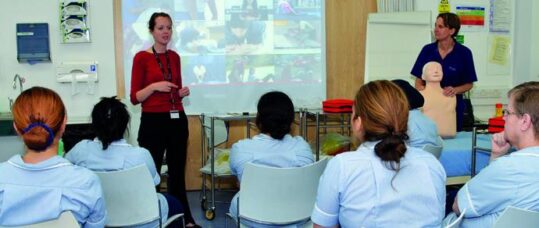Last day of nursing bursaries in England

As of Tuesday (1 August), student nurses and midwives can no longer receive Government bursaries to train in England.
The scrapping of bursaries for trainee nurses, midwives and allied health professionals marks the end of free university education for healthcare students in England.
Undergraduate nurse trainees will now have to take out student loans, on which repayments will start at 9% once they being to earn over £21,000 per year. That means for a nurse graduating now on the usual starting salary of £21,700 per annum, they would repay £5.25 per month.
Instead of the bursary, nursing undergraduates can apply for:
- A non-repayable grant of £1,000 per year if they have child dependants;
- Exceptional support of up to £3,000 per year in the case of severe hardship, and;
- Support for excess travel and dual accommodation expenses incurred by attending practice placements.
Bursaries for postgraduate trainee nurses, provided by NHS Business Services Authority (BSA), have been saved for the 2017/18 academic year.
Related Article: Supporting the development of advanced nursing skills in community nursing
The NHS BSA has also said that it will provide additional funding for some nursing, midwifery and allied health professional students because of the compulsory clinical placement required by these courses.
The Government has claimed that scrapping the bursary will help to secure the healthcare workforce by:
- Enabling universities to offer up to 10,000 extra training places on pre-registration healthcare programmes;
- Offering students around 25% more upfront financial support while studying – for example, a single student on a three-year programme would receive approximately £2,000 more each year on a student loan compared to an NHS bursary;
- Improving access to pre-registration undergraduate study for those from disadvantaged backgrounds, and;
- Giving students with an existing qualification the chance to get funding for a second degree.
However, earlier this year UCAS announced that there had been a 23% drop in students selecting nursing as their first choice compared to 2016.
Professor Ian Norman, executive dean of Florence Nightingale Faculty of Nursing and Midwifery at King’s College London, told Nursing In Practice: ‘What’s clear is that the previous system of commissioning did not work. It was not producing enough nurses and midwives. The replacement of the bursary by the loans was, I think, put forward as the least worst option.
‘In the long run, it might enhance the status of nursing because people are actually paying to do it because they’re investing their own money into it, and in fact, it may well increase the regard that nursing is given.
‘Also, it might even lead to remuneration, because if people are investing their money in being nurses or midwives, then employers will have to compete for these people.
‘My biggest concern for the bursary is that we have postgraduate diploma students – those who’ve already got a first degree. They are particularly excellent students and very well regarded by employers.
‘Postgraduate students are also maybe a bit more mature, they’ve thought through their career choice, they’ve taken a degree, they’ve maybe done work, and then they’re coming back.
Related Article: Q&A: What do field specific standards for community nursing mean for me?
‘I think the big danger of the bursary is that, in fact, it may well put people off going into nursing if they’ve already got a first loan.
‘It strikes me that the Government is very alert to this, because that’s been protected in September but the jury’s out as to what’s going to happen after then.’
The last chance for graduates to have their nursing training funded by the NHS under the new rules is to undertake a postgraduate course in September.
The two-year postgraduate diploma in nursing from Buckinghamshire New University is now the only nursing course at the institution with Government funding.
Sue West, dean of the faculty of society and health at Bucks New University, said many people may not be aware that the bursary for the PG Diploma is still available.
Related Article: £30million set aside to fund nurses in research positions
‘Embarking upon a university education, in any subject, may seem financially daunting, but there are so many schemes to help you with funding that university should never prove unaffordable,’ she said.
Eligible candidates from the UK and EU for the nursing diploma will receive the nursing bursary and have their tuition fees paid in full by the Department of Health for the two years of their course. They may also apply for a capped number of non-means tested annual grants of £1,000 from the NHS Bursary Scheme which will help with other costs of training.
‘The scrapping of the NHS funding is far from ideal,’ Ms West said but perspective undergraduates ‘should not give up on [their] dream,’ she urged.

See how our symptom tool can help you make better sense of patient presentations
Click here to search a symptom


Undergraduate nurse trainees will now have to take out student loans, on which repayments will start at 9% once they being to earn over £21,000 per year.



